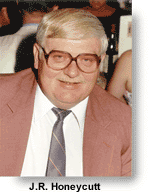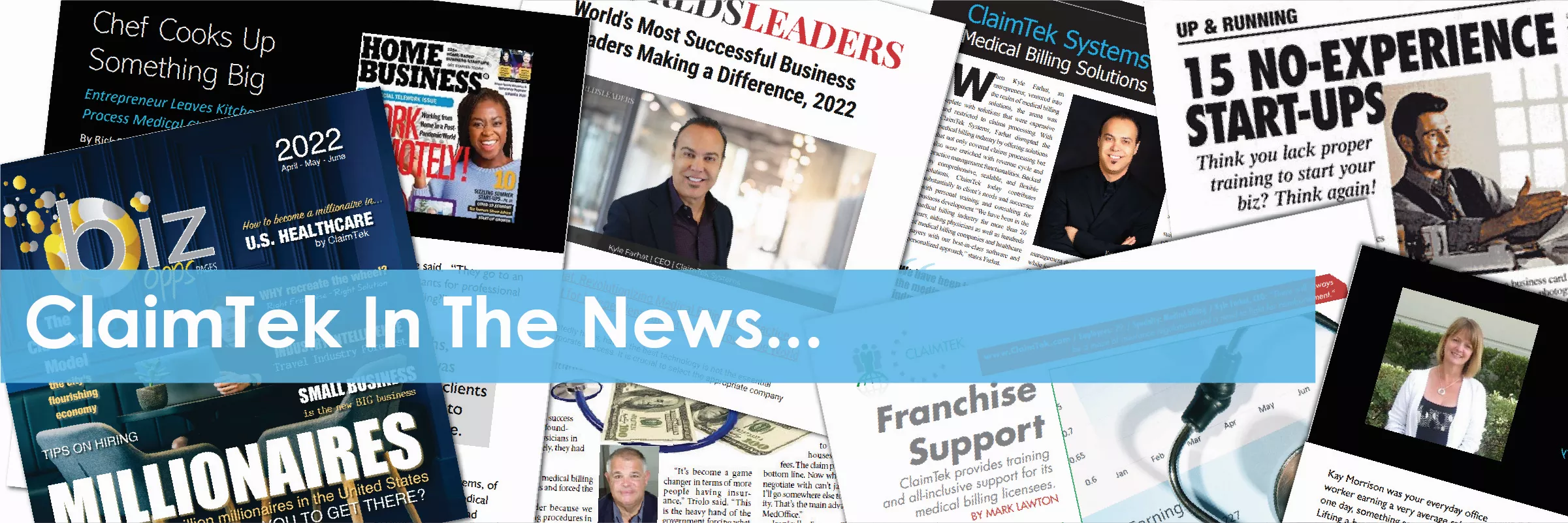ClaimTek In The Press!
Electronic Medical Billing Leads Home-Based Businesses.
Teachers, Loggers, Waitresses Among ClaimTek's Successes
Cover Story
Starting a new business is nothing new to Joseph Barish. He has sold toys,
owned rental homes, operated a convenience store and taught social studies
after graduating college at age 50.

And now Barish is enjoying a new career at 57 that he says is the best one ever
-- electronic medical claims processing.
“It's so easy it's almost a sin,'' joked the owner of Healthtec Solutions, Inc. of Cherry Hill, N.J” People
say they can't do this because they don't have a computer background. I was in the grocery business
for 29 years. It's challenging, but once you get the formula it's easy."
It's a familiar story around ClaimTek Systems, a national distributor of the leading electronic medical
claims software systems MedOffice and Lytec founded by President Kyle Farhat. ClaimTek's licensees
come from backgrounds as diverse as the American melting pot. Realtors and accountants are some of
the success stories, but so are a logger and casino waitress
They're mothers who want to run a home-based business. They're fathers tired of never seeing their
kids. They're sufferers of chronic health conditions that make working outside the home impossible.
They're among the 18.5 million Americans with home-based businesses that were once teachers,
loggers and waitresses
The common thread is ClaimTek's licensees want to seize control of their lives. They long for that
American dream of running a business. And true to the American spirit, they want maximum value for
their dollar without mortgaging their futures by buying expensive franchises that can cost more than
$100,000 plus annual royalties
Many were computer novices before starting. They thought windows were something you washed each
spring. DOS sounded like a Martian space probe. Uploading? Isn't that something the washing
machine does before the spin cycle?
J.R. Honeycutt only knew he wanted to get off the road from his job as regional manager of a grocery
store chain in North and South Carolina. Honeycutt drove more than 1,200 miles weekly that forced
him to change oil every three weeks versus three months for the average person. It left no time for a
personal life.
Unfortunately, high-paying jobs are scarce in Prosperity, S.C. despite the city's name. It's a small
town where everyone knows each other, but nobody knows what it's like to work in the technology
industry. Computers? You're not whistling Dixie when thinking this part of the nation isn't in tune with
the tech industry.

But that just leaves more business for Honeycutt. Afterall, even small towns
have doctors, and those in remote areas are often even less inclined to be
abreast of the latest technology. Honeycutt pulled off the road to spend more
time with his teenage son and wife and started H&H Processing in 1997. It
wasn't long before signing the first doctor visited after mailing a brochure.
“The doctor said `I've been looking for you' and I thought, `Oh, great, what have I done?” Honeycutt
said. “Halfway through he said to stop and I figured it was over. Instead, he wanted to know where to
sign.”
It's not always that easy, though Honeycutt soon added another three doctors that keep him busy but
not so much he can't make dinner at night for the family.
“I have my own business and peace of mind and do what I want to do than some corporate board
telling me what to do,'' Honeycutt said.
Linda Cunningham's startup story is a little more personal. In fact, it's downright tragic. Cunningham's
third child died of sudden infant death syndrome in 1996. Needless to say, it was devastating.
However, Cunningham returned to work and tried to move on with her life. But after becoming
pregnant a year later, Cunningham decided it was time to make changes.
A successful paralegal in Fairfax, Va. just outside the nation's capital, Cunningham decided to form a
home-based business after the birth of her next child in 1997. The previous loss made Cunningham
realize how special it is to spend as much time with her children.
“This business fits in very well into my personal life,'' Cunningham said. ``The flexibility is what I love
most. I can do things during the business day with my children and still be able to tend to business
matters. You can work weekends and evenings to get the work done.''
Cunningham was a legal eagle during her decade as a paralegal so it's not surprising she has
prospered with Medical Professional Services. Cunningham has four part-timers handling the billing for
six practices. The annual gross income exceeds six figures and Cunningham even bought a bigger
house to handle her growing needs.
Naturally, Cunningham researched many medical billing software companies through the internet
before choosing ClaimTek (claimtek.com). In fact, she cross-examined the three finalists by pitting
them against each other. Cunningham noticed how two companies balked when told she was
considering a competitor. Only ClaimTek didn't worry.
“I carefully monitored their reactions and two of three got very ugly and employed hard-sell tactics,''
Cunningham said. ``That turned me off right away. But Kyle Farhat was very understanding. He was
not a hard-sell businessman.''
Hard sell doesn't describe ClaimTek's licensees, either. Many say the growth rate of their company
often comes through referrals. That means business is coming to them.
Danna Mercer's Potpourri Business Services in Salem, Ore. handles 12 health care providers. She
gained the first three through traditional tactics like direct mail and knocking on doors. The other nine
were referrals. Indeed, 11 clients are mental health providers. It's a small world and they share good
news with their friends.
That's not a bad start for someone with no medical billing background and first read of the business in
a book entitled “How to Make Money on Your PC.''
“The business intrigued me,'' Mercer said. “I like the variety. I like technology, but also working with
people. This is a wonderful mix of ever-changing challenges of insurance.''
Mercer understands health care issues. The 47-year old suffers from chronic soft tissue pain that
would make working in a traditional office for a company more difficult. By forming her own home�based business, Mercer adjusts her schedule when not feeling well.
“If I'm having a bad day, I can rest and then work in the evening,'' Mercer said. ``If I can't sleep in
the middle of the night I get up and work.''
Mercer's eclectic career background includes tax auditor, accountant, dental assistant and bank
employee. Certainly, the mix provides a well-rounded perspective on claims processing.
But a unique perspective on both sides of the health care issue comes from Karen Jeghers of Carver,
Mass. A physician's assistant, Jeghers is the one who makes you say ``aah,'' writes prescriptions and
handles essentially the same tasks as a doctor.
The growing need for medical claims processors who understand both ends of the billing process and
the increasing demands of four young children prompted Jeghers to start Compliant Billing Services.
As a health care provider, she knows the frustrations of dealing not only with the immediate demands
of patients, but also the long-term demands of their health care programs. She has to sometimes
rewrite prescriptions to fit the insurance carrier's requirements and carefully word treatments to get
paid.
“No matter what part of health care you're in you realize it's confusing,'' Jeghers said. “As a provider,
I have to work with HMOs to get people the medicine they need. The billing has its own rules and
regulations. But electronic claims processing makes it so easy. Just push a button and it's gone.''
Now you may be wondering why a health care provider would switch to claims processor.
Afterall, it
seems a step down. However, the increased flexibility and crying demand for processors has led the
36-year-old Jeghers to switch roles.
“Some people think it's step backwards, but this is my own business and I have more input in how it
goes,'' she said. “When you have a company that works for itself your incentive is to do a good job.
I'm vested in this process. I'm overqualified in a sense, but it's a completely different job. There are a
lot of different providers and I'm educating providers on coding. Providers are last to know about
coding and if we're not doing it correctly then the whole process breaks down.''
Sometimes, it's just looking for a change that prompts people into becoming medical claims
processors. You know, a desire to get out of the rut.
Marion Cameron moved from Buffalo to Woonsocket, R.I. in 1999 to be near his daughter, Andrea.
The 55-year-old was restless for change after many years as a private investigator.
Something a little
easier. Something a little different. As long as he was changing addresses, why not change careers?
That's when he formed Medical Billing Management

“When you're my age, it's real rewarding to be stationary eight hours a day,'' Cameron joked.
``When you're right in what you do and follow up on claims, it's a good feeling.''
Nancie Cummins Walls may be 3,000 miles from Cameron, but the Mateo, Calif. mother of two felt the
same yearning to try something different. The successful insurance agent knew plenty about the ins
and outs of the forms and felt it would be an easy transition to process claims.
But she had no idea how easy it would be when forming Medical Management Billing. After gaining her
first client, the next 14 were referrals that forced Walls to hire three part-timers.
“Anybody can do it,'' Walls said. ``If you apply yourself there's no reason why you can't do well.
There's no ceiling to your income. I had to decide how big I want to be.''
Like many licensees, Walls specializes in one type of claim, though it's not required. Workers
compensation cases make her very popular among chiropractors, general practitioners and surgeons,
but she also processes claims for mental health providers.
Walls said her success is based on providing a wide array of services based on the MedOffice and
Lycos software that has 10 applications providing spread sheets showing cash flow to health care plan
analysis.
“I can read their contracts and make comparisons on whether they have too much money in managed
care plans,'' Walls said. “I keep them out of trouble with health care plans that have problems. It's
crucial to stay abreast of them. One of the positives is watching providers make decisions based on
my reports.''
Despite the diverseness of ClaimTek's licensees, they share many commonalities. First, they spent
months researching companies offering medical claims software. Some were tripped up by those
offering a software package for a few hundred dollars. Oh, did they regret doing that.
“I got scammed,'' Jeghers admitted. ``In retrospect, I acted on a whim answering an ad in the paper.
It sounded good and wasn't a lot of money. If I had taken the time to think about it I wouldn't have
done it. I almost gave up on the venture, but I came across ClaimTek. Kyle Farhat gave references
and demos and they were good. It was more expensive than others, but I know medicine and I can
look at the paperwork and know what happened medically, but I didn't know about billing so I wanted
to know how to do it. It's nice to have backup support.''
Walls fell into the trap, too. The company offered no support when she needed answers. Cameron was
lucky. He spotted problems from tech support when working with another company's software demo.
These stories show why finding a well-rounded company offering a complete package of software,
training, marketing and support is the only way to build a business.
“There's good companies and there's bad companies,'' Cunningham said. ``A lot of bad businesses
will make promises that this is a get-rich-quick business and sell you an outdated $400 software
package that is all you need to be successful. These schemes shed a bad light on reputable companies
like ClaimTek that do stand behind their product.''
Indeed, ClaimTek was singled out for its excellence by Rick Benzel, author of ``Making Money in a
Health Service Business on your Home-Based PC.''
“In my opinion, Kyle Farhat and ClaimTek are the real medical billing specialists if you are seeking to
start a new business,'' Benzel said. ``ClaimTek is the only reliable one around. I can personally attest
to the dedication, commitment and expertise of Kyle Farhat, who is a smart software developer,
excellent trainer and savvy consultant.''
Indeed, choosing the right medical billing business vendor is often the difference between success and
failure. The detail to attention and depth of service are why ClaimTek has helped launch many
successful licensees.
“It's an incredible industry, but people need to get solid marketing, training, software and support.
Anything short of that is asking for trouble,'' Farhat said. ``Buying a $400 program from unrepeatable
sources is nothing more than buying a broken promise. If people look into it they'll realize it's nothing
more than a scam. These companies won't provide software demos. They tell stories that aren't true.
You're basically shredding $400.''
Farhat is noted for his comprehensive training, exhausted support, free software upgrades and
standout marketing materials. But it's nice when the students start to exceed the master when
expanding their businesses. When it comes to getting clients, many of ClaimTek's licensees have
created their own styles.
Barish gives away one month of service free at charity auctions. Once clients try his service, they
seldom leave.
Honeycutt is even smoother. He always brings candy to office managers during his monthly visits. A
simple act of kindness costing pennies makes Honeycutt a welcome sight to overwhelmed workers.
“Everyone one of my office managers say they'll quit if I ever leave them,'' Honeycutt joked. ``I'm
part of their company now.''
Ironically, many of ClaimTek's licensees say they're most surprised that health care providers are not
strong businessmen. It seems they were too busy worrying over healing people than making a buck.
That makes claims processors even more important.
“It has to be that way because it requires a huge amount of time to take care of patients,'' Jeghers
said. ``But the business end of it is important, too. Some have really good business managers
because it's tough to be both health care provider and businessman.''
Said Walls: “Some doctors are so involved in their day-to-day practice that they don't realize the
electronic age is passing them by. It's such a crisis mode most of the time that they don't have time
to learn the new technology.''
That's why electronic medical billers have become an invaluable part of many healthy care practices.
With 60 million baby boomers becoming the graying part of demographics, health care is becoming
the hottest industry, according to U.S.
Government statistics. Ten billion health claims were filed in 2000, twice that in 1990.
That's why the two hottest job markets through 2006 will be computer and data processing and health
care services. Electronic medical billing combines both areas with plenty of room for growth. Only 30
percent of claims were electronically filed in 2000, six times more than 1994 but still plenty of room
for growth.
“Health care claims processing has to go electronic,'' Farhat said. ``You can file your taxes online.
Stock trading is online. This is the future.''
Afterall, there are 1,500 different health plans nationwide. The average health care provider filed 440
claims monthly, and many processors receive between $1 to $3 per claim.
Doctors want electronic medical billers because they get their money faster. Indeed, manual
processors mailing forms sometimes take 10 weeks to receive payment while electronic processors
often receive payment within 2 weeks. A study showed the 37 percent error rate for manual claims is
often reduced to one percent when electronically filed.
Much of that reduction comes from
independent processors like ClaimTek's that work outside the office without distraction and a higher
experience rate. In essence, ClaimTek's licensees aren't handling patients, answering phones and
other interruptions that plagued medical office workers so they don't make many errors that delay
payment.
“This is our specialty compared to a doctor's staff that wears many hats,'' Cunningham said. ``They're
multi-tasking and billing is one of the last things that gets attention. Follow up on unpaid claims is not
done in a comprehensive manner.''
One doctor told Cunningham his cash flow increased 3,000 percent a few months after her arrival.
Most results aren't nearly that dramatic, but hefty increases are the norm.
Afterall, electronic medical claims processing is about making money for everyone. Health care
providers get paid. Patients aren't bothered over unpaid delays.
Insurance carriers waste less time
processing claims. ClaimTek's licensees have businesses they profit from both emotionally and fiscally.
Electronic medical claims processing -- it's a win-win situation


